Input interpretation

chlorodifluoromethane
Chemical names and formulas
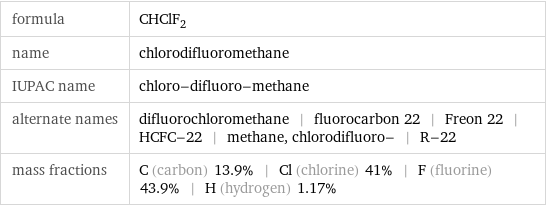
formula | CHClF_2 name | chlorodifluoromethane IUPAC name | chloro-difluoro-methane alternate names | difluorochloromethane | fluorocarbon 22 | Freon 22 | HCFC-22 | methane, chlorodifluoro- | R-22 mass fractions | C (carbon) 13.9% | Cl (chlorine) 41% | F (fluorine) 43.9% | H (hydrogen) 1.17%
Lewis structure
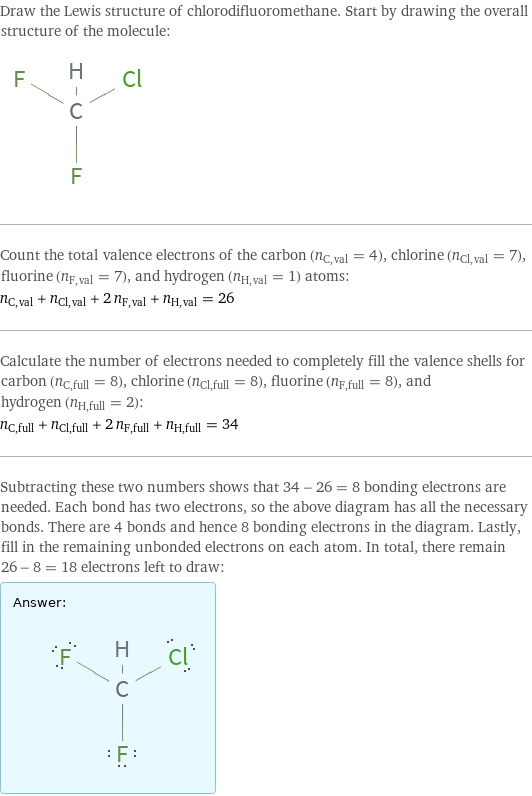
Draw the Lewis structure of chlorodifluoromethane. Start by drawing the overall structure of the molecule: Count the total valence electrons of the carbon (n_C, val = 4), chlorine (n_Cl, val = 7), fluorine (n_F, val = 7), and hydrogen (n_H, val = 1) atoms: n_C, val + n_Cl, val + 2 n_F, val + n_H, val = 26 Calculate the number of electrons needed to completely fill the valence shells for carbon (n_C, full = 8), chlorine (n_Cl, full = 8), fluorine (n_F, full = 8), and hydrogen (n_H, full = 2): n_C, full + n_Cl, full + 2 n_F, full + n_H, full = 34 Subtracting these two numbers shows that 34 - 26 = 8 bonding electrons are needed. Each bond has two electrons, so the above diagram has all the necessary bonds. There are 4 bonds and hence 8 bonding electrons in the diagram. Lastly, fill in the remaining unbonded electrons on each atom. In total, there remain 26 - 8 = 18 electrons left to draw: Answer: | |
3D structure

3D structure
Basic properties
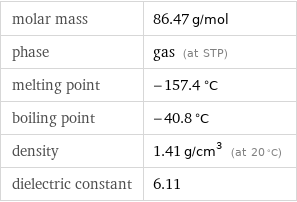
molar mass | 86.47 g/mol phase | gas (at STP) melting point | -157.4 °C boiling point | -40.8 °C density | 1.41 g/cm^3 (at 20 °C) dielectric constant | 6.11
Gas properties (at STP)
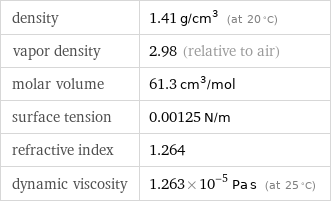
density | 1.41 g/cm^3 (at 20 °C) vapor density | 2.98 (relative to air) molar volume | 61.3 cm^3/mol surface tension | 0.00125 N/m refractive index | 1.264 dynamic viscosity | 1.263×10^-5 Pa s (at 25 °C)
Units

Thermodynamic properties
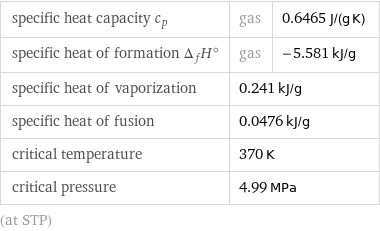
specific heat capacity c_p | gas | 0.6465 J/(g K) specific heat of formation Δ_fH° | gas | -5.581 kJ/g specific heat of vaporization | 0.241 kJ/g | specific heat of fusion | 0.0476 kJ/g | critical temperature | 370 K | critical pressure | 4.99 MPa | (at STP)
Units

Phase diagram
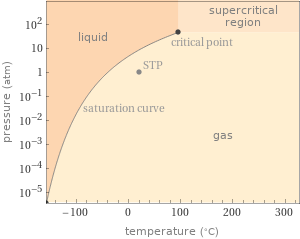
Phase diagram
Units

Chemical identifiers
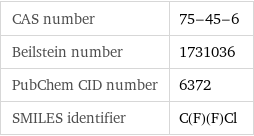
CAS number | 75-45-6 Beilstein number | 1731036 PubChem CID number | 6372 SMILES identifier | C(F)(F)Cl
NFPA label

NFPA label
Safety properties

flash point | -78 °C autoignition point | 632 °C upper explosive limit | 26.9% (concentration in air)
Toxicity properties

odor | low short-term exposure limit | 4375 mg/m^3
Units
